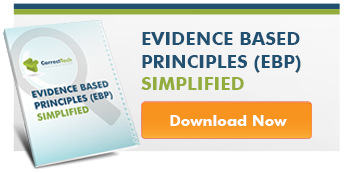In earlier blogs, we discussed some of the advantages of case planning from a risk-reduction perspective. One of the key challenges in operating from a risk perspective is answering a critical question, Where do mental health symptoms fit when working with justice-involved adolescents and adults?
Read MoreMaking Sense of the Interrelationship Between Criminal Risk Domains and Mental Health Symptoms
Posted by Raymond Chip Tafrate, PhD, Damon Mitchell, PhD, & David J. Simourd, PhD on 10/10/19 10:36 PM
Topics: Community Corrections, Evidence Based Practices, Assessment, Risk Principle, Practice Models, responsivity, reentry, high risk client
Risk: A “Four-Letter Word”
Posted by Harris Childers on 5/30/19 10:06 PM
We corrections professionals love to drop the r-bomb. I’m not talking about responsivity, although it is a critical component of EBP that is often neglected if not outright ignored. I’m talking about RISK, that four-letter word that precedes need every time we talk about supervising justice-involved individuals. Assessing criminogenic risk is fundamental to our mission; that’s a given. But what message do we send when we say someone is high risk? Are we poisoning the well, compounding the stigma, and adding barriers to achieving those other coveted “r-words” - rehabilitation, reintegration, and recidivism reduction?
Read MoreTopics: Evidence Based Practices, Risk Principle, responsivity, risk, EBP, Criminal Justice Reform
The T's and C's : No Longer the ABC's in Community Corrections
Posted by Lisa Sayler on 4/26/18 12:21 PM
Community Corrections is Changing...Are You?
Change is hard. We expect our clients to change but when faced with change ourselves, we can often resist. We expect someone who has lived a certain way for 20, 30, 40+ years to make abrupt changes but when we give up sweets and our colleague brings donuts in, we gobble them down and vow that was the last time. We get a speeding ticket and vow to not speed anymore but once the initial sting has worn off, we look down and notice we are going 40 in a 30 and didn’t even realize it. It’s so much easier for people to change when it’s not us. It takes a lot of practice, new habits and even failure, to change. Sure, there is a valid difference, if an offender doesn’t change criminal behavior, there are serious consequences to their freedom, not just to their waistline or pocket book. But if those consequences were all it took; community corrections might not exist.
Community Corrections is changing. The change has been in the works ever since the early “what works” and “EBP” research pointed us to new approaches. What is different now is the change is hitting closer to home to the daily routines, decision making and programming. We know this through our conversations with practitioners all around the country and many in some of the most progressive states in community corrections, who are looking for support in meeting new and existing requirements from oversight agencies. While many in the field are excited about the changes, others are left feeling anxious, frustrated and resistant to change. Just like many of our clients feel upon entering a program. While it is easier not to change our own practices, we must continue to try new approaches and work to improve long term results. It doesn’t mean we don’t hold our clients accountable, it means we expand and adapt our approach and learn we have other tools in our toolbelt. People, even community correction professionals, must be held accountable to change in ways that move towards improved results.
Read MoreTopics: Community Corrections, Evidence Based Practices, Motivational Interviewing, Community Corrections Professional, Change, what works, responsivity, impact sessions, intrinsic motivation, client development
Subscribe To Our Blog
Recent Posts
Posts by Topic
- Community Corrections (63)
- Evidence Based Practices (44)
- Community Corrections Professional (23)
- Software (15)
- Practices (12)
- Change (11)
- Technology (10)
- Risk Principle (8)
- reentry (8)
- probation staff (7)
- EBP (6)
- Outcomes (6)
- client development (6)
- client needs and values (6)
- coaching community corrections clients (6)
- Assessment (5)
- Community (5)
- Developing a practice model (5)
- Justice-Involved Clients (5)
- Remote work (5)
- The Coaching Habit (5)
- parole (5)
- risk (5)
- tele-supervision (5)
- tele-work (5)
- Community Engagement (4)
- Evan C. Crist (4)
- Community Corrections Client Services (3)
- Criminal Justice Reform (3)
- Implementation (3)
- Listening Skills (3)
- Motivational Interviewing (3)
- Policy (3)
- Positive Reinforcement (3)
- Practice Models (3)
- high risk client (3)
- reaching clients emotions (3)
- responsivity (3)
- Addiction (2)
- BOP (2)
- Conferences (2)
- ICCA (2)
- Management (2)
- Michael Bungay Stanier (2)
- Relapse Prevention (2)
- halfway house (2)
- jic (2)
- paperless office (2)
- principles (2)
- procedures (2)
- program results (2)
- APPA (1)
- Appreciative Thinking (1)
- Brian Lovins (1)
- COVID-10 (1)
- Community Connection (1)
- Coronavirus (1)
- Crisis (1)
- Customer Service (1)
- Data Management (1)
- Fidelity (1)
- ICCA Seattle (1)
- Juvenile Corrections (1)
- Leadership (1)
- Monitor History (1)
- Opioid Addiction (1)
- Opioid Crisis (1)
- Orange is the New Black (1)
- Program Data (1)
- Reforms (1)
- Relapse (1)
- Second Chances (1)
- Switch by the Heath Brothers (1)
- Treatment (1)
- drug testing (1)
- going paperless (1)
- govcio outlook (1)
- impact sessions (1)
- innovation (1)
- intrinsic motivation (1)
- justice reinvestment (1)
- marijuana testing (1)
- money savings (1)
- opiod testing (1)
- purpose (1)
- remote working (1)
- resources (1)
- sanction (1)
- staff productivity (1)
- technology solutions provider (1)
- the awe question (1)
- what works (1)
- what's on your heart (1)
- work from home (1)





